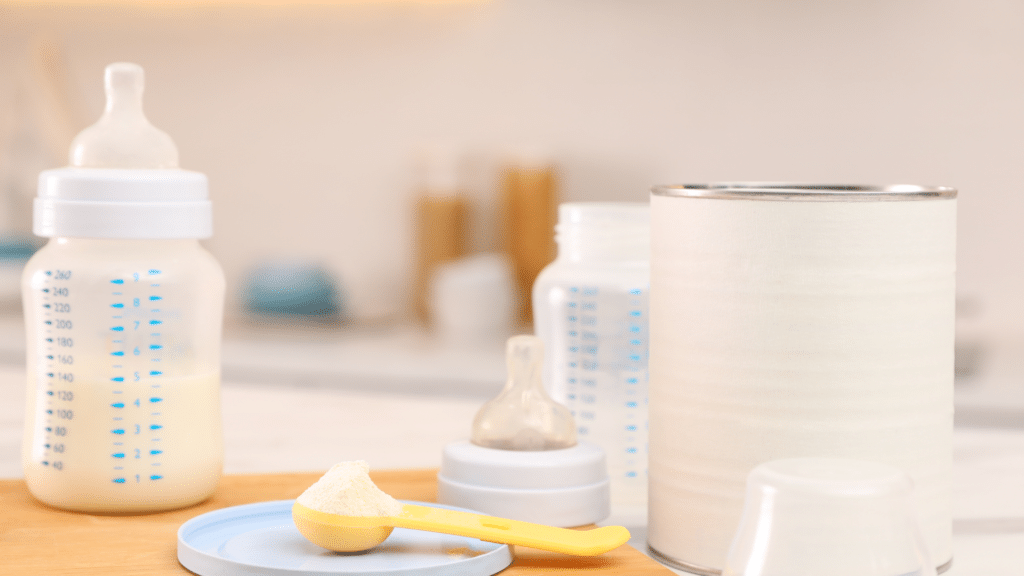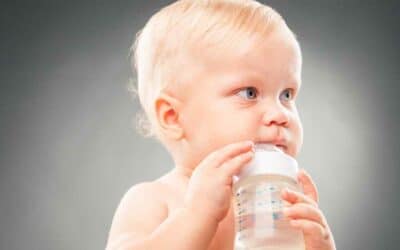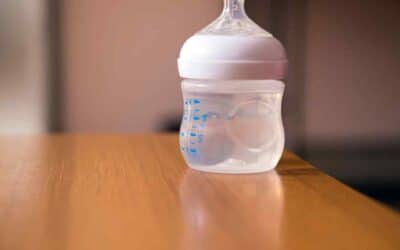When providing the best nutrition for your baby, the quality of water used to prepare infant formula plays a crucial role. As parents, we often compare purified water with distilled water, wondering which is the better option for our little ones.
In this blog post, we will explore the differences between purified and distilled water, their implications on infant health, and the best practices for ensuring safe water for formula preparation.
We will also discuss the importance of consulting healthcare professionals for personalized advice on infant formula preparation and feeding. So, let’s dive in and uncover the facts about purified and distilled water to make an informed decision for your baby’s well-being.

Understanding Purified Water
Purified water has undergone various treatment processes to remove impurities, contaminants, and undesirable elements. These processes ensure the water is safe for consumption and meets the required quality standards, making it suitable for use in baby water and liquid concentrate formula.
Common Methods of Purifying Water
There are several methods employed to purify water, including:
- Distillation: This process involves heating water to create steam, which is then collected and condensed into liquid form, leaving impurities behind.
- Reverse Osmosis: This method uses a semipermeable membrane to filter out contaminants from the water.
- Filtration: This technique involves passing water through filters to remove particles, sediment, and other impurities.
- Ultraviolet (UV) Treatment: UV light kills microorganisms and pathogens in the water.
Pros and Cons of Using Purified Water for Infant Formula
There are both advantages and disadvantages to using purified water when preparing baby formula:
- Pros: Purified water is free from contaminants and impurities, ensuring that the water for baby formula used to mix with the formula is safe for your baby. This can help reduce the risk of gastrointestinal and other health problems associated with contaminated water.
- Cons: Some purified water may lack essential minerals that are beneficial for your baby’s growth and development. Additionally, the cost of purchasing purified water can be higher than tap water, which may concern some families.

Exploring Distilled Water
Distilled water is purified water with contaminants and minerals removed through distillation. During distillation, water is heated until it becomes steam, leaving impurities and dissolved solids behind. The steam is collected and cooled, returning to water free of contaminants. This process results in low-fluoride bottled water with just a few drops of impurities.
Benefits
- Reduced Contaminants: Distilled water has fewer impurities and contaminants, making it a safer option for mixing with infant formula.
- No Minerals or Additives: Distilled water does not contain minerals or additives that may interfere with the absorption of nutrients in the infant formula.
- Reduced Risk of Waterborne Illness: Using distilled water can lower the risk of waterborne illnesses caused by bacteria, viruses, and parasites that may be present in tap water.
Limitations
- Lack of Beneficial Minerals: Distilled water does not contain beneficial minerals such as calcium and magnesium, essential for infant growth and development.
- Cost and Availability: Distilled water can be more expensive and less readily available than tap or filtered water.
- Environmental Impact: The distillation process requires significant energy, which may contribute to a larger carbon footprint.
Safety Considerations Regarding Distilled Water Usage
- Storage and Handling: Store distilled water in a clean, closed container to prevent contamination. Use distilled water within a short period after opening to ensure its purity.
- Follow Formula Instructions: Always follow the infant formula packaging instructions regarding the amount of water to be used. Using too much fluoride or fluoridated water can lead to health issues in infants.
- Boiling Distilled Water: Although distilled water is purified, boiling the water before using it to prepare infant formula is still recommended. Boiling further ensures that any potential contaminants are eliminated.
- Consult a Healthcare Professional: If you have concerns about using distilled water for infant formula, consult a healthcare professional for guidance and recommendations tailored to your baby’s needs.

Water Quality Requirements for Infant Formula
To ensure the safety and health of infants, it is crucial to use water that meets minimum quality standards when preparing infant formula. The water should be:
- Safe to drink: Use water suitable for drinking, such as tap water, filtered water, or bottled water. In some cases, boiling tap water to kill potential pathogens may be necessary before preparing the formula.
- Low in minerals: Water with low mineral content, such as distilled or demineralized water, is preferred for infant formula preparation, as high levels of minerals can harm babies’ developing kidneys.
- Free from contaminants: The water should be free from harmful contaminants, including bacteria, viruses, heavy metals, and chemical pollutants.
- Neutral pH: The water should have a neutral pH level (around 7) to ensure proper mixing and absorption of nutrients in the formula.
Potential Contaminants to Avoid in Infant Formula Water
Several contaminants can pose risks to infants if present in the water used to prepare formula. These include:
- Bacteria and viruses: Pathogens such as E. coli, Salmonella, and rotavirus can cause severe infant illness. Boiling water for at least one minute can help kill these organisms.
- Heavy metals: Lead, mercury, and arsenic are toxic metals that can harm infants if ingested. Ensure that your water source is tested and free from these contaminants.
- Nitrates: High levels of nitrates in water can cause methemoglobinemia, a condition that reduces the blood’s ability to carry oxygen. This is especially dangerous for infants under six months of age.
- Pesticides and chemicals: Pesticides, herbicides, and industrial chemicals can contaminate water sources and pose health risks to infants. Using filtered or bottled water can help reduce the risk of exposure to these contaminants.
Importance of Maintaining Cleanliness and Hygiene During Preparation
Maintaining cleanliness and hygiene during infant formula preparation is essential to protect babies from potential illnesses and infections. Follow these guidelines to ensure proper hygiene:
- Wash hands: Always wash your hands thoroughly with soap and warm water before handling infant formula or feeding equipment.
- Clean surfaces and utensils: Ensure all surfaces, bottles, nipples, and other feeding equipment are clean and sanitized before use.
- Follow storage guidelines: Store infant formula in a cool, dry place, and adhere to the manufacturer’s guidelines for proper storage and expiration dates.
- Mix formula correctly: Follow the manufacturer’s instructions, using the correct amount of water and powder to ensure proper nutrient balance.
- Discard leftover formula: Do not reuse leftover formula, as bacteria can grow rapidly in a prepared formula. Discard any formula that has been at room temperature for over two hours or in the refrigerator for more than 24 hours.
By adhering to water quality requirements and maintaining proper hygiene during infant formula preparation, caregivers can help ensure the safety and well-being of their babies.

Comparing Purified Water and Distilled Water
When choosing the best water source for mixing infant formula, parents often compare purified and distilled water. While both types of water undergo treatment processes to remove impurities and contaminants, there are some notable differences between the two.
Regarding similarities, distilled or purified water is considered safe for consumption and free from harmful substances. This makes them suitable options for mixing with infant formula, ensuring that your baby receives the necessary nutrients without the risk of ingesting contaminants.
However, there are differences in their composition and potential contaminants. Purified water is treated through various methods, such as filtration, reverse osmosis, or UV treatment, while distilled water specifically undergoes the process of distillation.
As a result, distilled water may have a higher degree of purity and fewer dissolved minerals than purified water. This mineral content difference can impact the infant formula’s overall quality, as some essential minerals beneficial for your baby’s growth and development may be lacking in distilled water.
Guidelines and Recommendations
Follow the regulatory standards and guidelines set by organizations such as the World Health Organization (WHO) and the Food and Drug Administration (FDA) for infant formula preparation. These guidelines typically include the following:
- Properly washing hands and sterilizing all feeding equipment.
- Following the manufacturer’s instructions for the appropriate ratio of formula powder to water.
- Mix the formula using water that has been boiled and cooled to a safe temperature (around 70°C or 160°F).
- Cooling the prepared formula to a suitable temperature for feeding (approximately body temperature) and checking the temperature before feeding.
Best Practices for Ensuring Safe Water for Formula Preparation
To ensure safe water for infant formula preparation:
- Use tap water from safe and reliable or bottled water if necessary.
- Boil tap water for at least one minute to kill any potential contaminants, and then let it cool to the appropriate temperature before mixing it with the formula.
- Store unused boiled water in a clean, covered container for up to 24 hours.
Consulting With Healthcare Professionals for Personalized Advice
Consult healthcare professionals such as pediatricians or dietitians for personalized advice on infant formula preparation and feeding. They can guide you in selecting the most appropriate formula for your baby’s needs and advise on proper preparation and storage techniques.
Alternatives to Purified and Distilled Water for Infant Formula Preparation
While the use of both purified and distilled water in the preparation of infant formula are generally regarded as safe, it’s also important to explore alternatives that can potentially enhance the nutritional content of your baby’s formula, support their development, and perhaps even provide cost-effective solutions for your family. In this section, we’ll examine other types of water, such as mineral water and spring water, offering an inclusive perspective to help you decide the best for your baby.
Understanding Mineral Water
Mineral water emerges from underground reservoirs and contains an array of naturally occurring minerals such as magnesium and calcium. These minerals play a significant role in bone development and other critical physiological functions in infants. The total mineral content can vary significantly depending on the source, and some mineral waters may even naturally contain fluoride, a mineral important for the growth and development of children’s teeth.

Pros and Cons of Using Mineral Water for Infant Formula
Pros: One of the main advantages of using mineral water for infant formula is its naturally occurring mineral content, essential for your baby’s growth and development. This means your baby can receive essential minerals alongside their feed, potentially reducing the need for additional supplementation.
Cons: Because the mineral content can differ depending on the source, some mineral water may contain salts like sodium. High sodium levels aren’t suitable for infants, so it’s essential to check the water composition before use. Additionally, mineral water tends to be more costly than tap water, so the overall expense can be a concern for families.
Exploring Spring Water
Spring water is sourced directly from a natural spring, and similar to mineral water, contains various minerals beneficial to infants’ growth. The water quality can vary, so ensure it has been adequately tested and approved for drinking.
Pros and Cons of Using Spring Water for Infant Formula
Pros: Spring water can be a great source of essential minerals and is generally considered safe for infant formula preparation, provided that it’s been adequately tested and approved for drinking.
Cons: As with mineral water, the quality and mineral content of spring water can vary widely, necessitating proper vetting of the source. It’s key to ensure that it doesn’t contain any harmful substances or high levels of salts unsuitable for infants.
Safety Considerations in Using Alternatives
Irrespective of the type of water used, safety should always be a top priority. Follow these guidelines:
- Check Labels: Always check the label when purchasing water. Avoid products high in sodium (Na) or sulfates (SO4), which aren’t suitable for infants.
- Boil First: Regardless of the source, it’s crucial to boil the water first to ensure any possible pathogens have been killed, reducing any potential risk of infection.
- Follow Formula Instructions: Following the formula’s instructions, carefully measure the right amount of water to ensure your baby gets the right balance of nutrients.
- Consult a Healthcare Professional: Always consult with a healthcare professional if you’re unsure.
While purified and distilled water are safe options for infant formula preparation, other options like mineral and spring water can provide valuable minerals crucial for your baby’s development. These alternatives offer an inclusive view to help you make an informed decision based on your baby’s dietary needs, your personal preferences, and your budget.
Remember, every baby is unique, and so are their nutritional needs. It’s always advised to consult with healthcare professionals to ensure your baby gets an individually tailored diet appropriate for their needs. By doing so, you can be confident that you’re providing your baby with the nourishment they need to grow and thrive.

Conclusion
In conclusion, purified and distilled water are safe options for preparing infant formula, as they undergo treatment processes to remove impurities and contaminants. However, distilled water may have higher purity and fewer dissolved minerals than purified water.
This mineral content difference can impact the infant formula’s overall quality, as some essential minerals beneficial for your baby’s growth and development may be lacking in distilled water.
To ensure the safety and well-being of your baby, it is crucial to follow regulatory guidelines, maintain proper hygiene during formula preparation, and consult with healthcare professionals for personalized advice.
By adhering to these best practices, parents can make an informed decision about the type of water they use for their baby’s formula and provide the best possible nutrition for their little ones.
Did this article help you? If you have any questions about it, feel free to ask them in the comments below.



